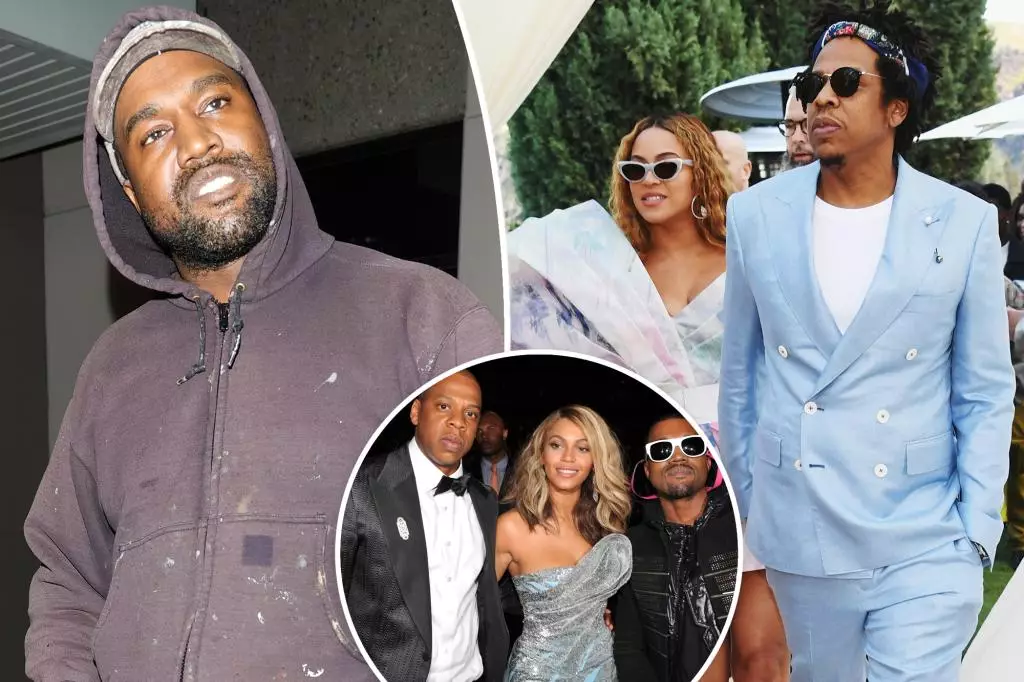In a world primed for celebrity headline news, few figures have captivated and polarized audiences quite like Kanye West. His recent tirade against Beyoncé and Jay-Z has sparked a relentless wave of discussion about the unseen dynamics within the music industry, celebrity friendships, and mental health under the scrutiny of fame. West sent shockwaves through social media by expressing an inexplicable resentment towards the Carters, particularly concerning their children. His unfounded attack on Sir and Rumi, who are merely seven years old, raises serious ethical questions about the responsibilities that come with fame and public opinion.
West’s emotions often seem to veer from vulnerability to fury; this most recent episode was no exception. After lamenting his feelings of betrayal regarding his relationships within the industry, he abruptly apologized in an almost childlike tantrum. His tweet stating, “I LOVE JAY Z AND I DO FEEL BAD,” was not just an act of remorse but rather a convoluted attempt to rationalize his outburst. His acknowledgment that he has always felt like the “black sheep” illustrates a deep-seated longing for acceptance, which he seemed to believe was denied to him by those closer to him, particularly during moments of personal crisis, like his wedding to Kim Kardashian.
The Seeds of Resentment
From Bitcoin to fashion and music, West’s entrepreneurial spirit has often been overshadowed by his personal struggles. In the past, his relationship with Jay-Z was characterized by collaboration and mutual respect, making it all the more poignant when West’s envy bubbled to the surface. His feeling of “slightedness,” particularly over missed invitations and professional opportunities, builds a narrative of a man grappling with the weight of expectations, friendships, and the industry’s maneuverings. While West has been vocal about his disenchantment— culminating in supposed acts of backward loyalty—one cannot help but question whether these grievances reveal a more profound void, fueled by his flagging mental state.
Weren’t we just coming out of the COVID crisis? Amidst the chaos of the pandemic, he appears to have cultivated feelings about his rivalries and friendships without any conceivable moderation. This unwillingness to respect boundaries becomes problematic, especially when West directs his misplaced anger at the children of his former friends. The notion that Jay-Z and Beyoncé could have leveraged their public platforms to aid West is a dangerous belief rooted in entitlement. It fundamentally obscures the responsibilities tied to each individual, particularly when parenting is involved.
The Social Media Dilemma
West’s choice to vent his frustrations on platforms like Twitter underscores the blurred lines between personal expression and public accountability. His admission of deleting a vile tweet not out of morality, but to avoid being “canceled,” offers critical insight into West’s psyche. This behavior hints at an internal battle, where the desire for authenticity clashes with the instinct for self-preservation.
Indeed, the music industry operates on carefully curated images, and this latest incident serves as a reminder of the fragility of those images. When West deviates from this script, he not only threatens his reputation but also opens up discussions around the culture of celebrity, where personal grievances are often monetized into public spectacle.
Social media might amplify voices, but it also magnifies missteps, pushing celebrities into a perilous game where their every statement can lead to public outrage. Long gone are the days where artists could have private disputes; instead, we are forced to confront their emotional outpourings in real-time, dissected and often ridiculed by a rabid audience.
Reflections on Mental Health
At the heart of West’s grievances is a reflection of mental health challenges that trouble not only celebrities but society at large. Traditional narratives often strip away the layers of complexity, rendering artists as mere caricatures of their public personas. West’s case illuminates how feelings of betrayal, inadequacy, and rage manifest in destructive behaviors, and while his tirade may seem like a personal issue, it powerfully echoes a larger struggle faced by many: the fight for validation in a world that often offers little comfort.
As audiences tune in for the latest antics, it becomes crucial to navigate the conversation around celebrity with empathy. Each tweet, each headline, may represent deeper fractures not only in personal relationships but within the very fabric of artistic integrity in a tumultuous social world.

